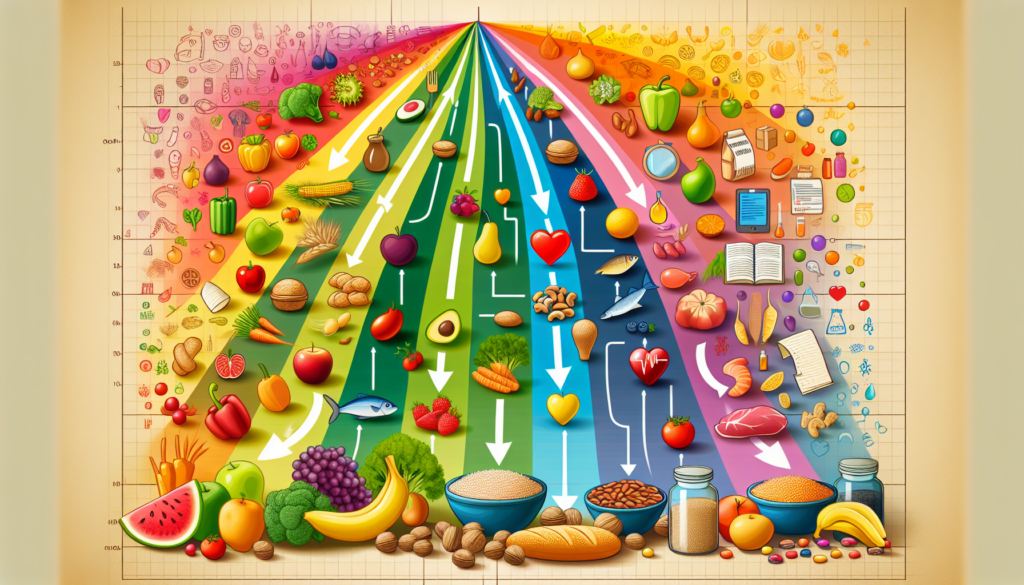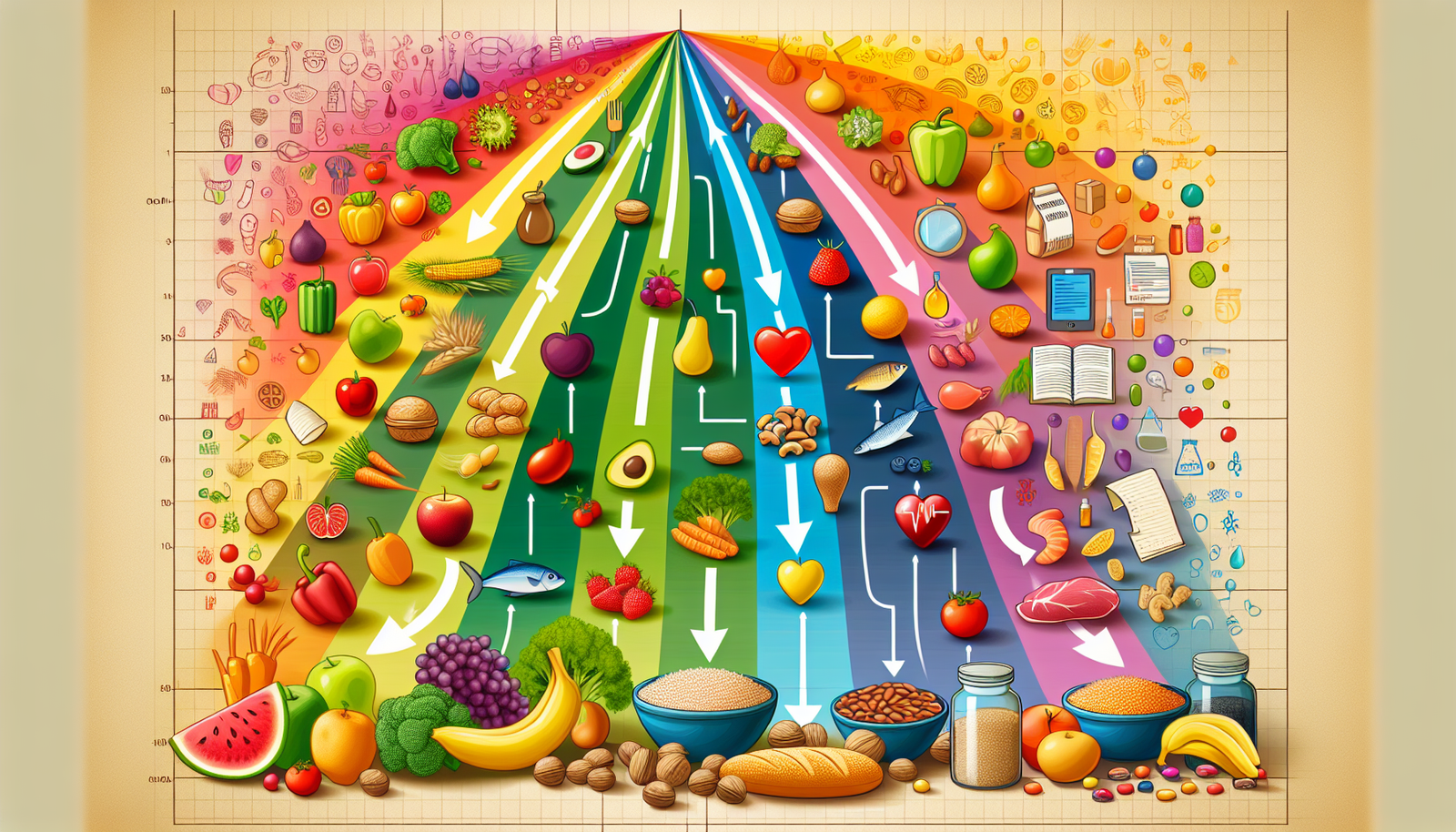Are you interested in taking control of your health and preventing disease? Look no further than the power of nutrition. In this article, we will explore the various ways that you can harness the benefits of a well-balanced diet to promote overall wellness and protect against common illnesses. From boosting your immune system to reducing the risk of chronic conditions, discover the incredible potential of nutritional approaches in safeguarding your long-term health. So grab a seat, and let’s embark on this journey to a healthier you!
1. Importance of a Healthy Diet
A healthy diet plays a crucial role in maintaining overall health and well-being. By providing essential nutrients, a balanced diet supports the proper functioning of the body and promotes optimal health.
1.1 Nutrients for Overall Health
Nutrients such as vitamins, minerals, proteins, carbohydrates, and fats are essential for our body to function at its best. These nutrients are responsible for various bodily processes, including metabolism, growth, and repair. Including a wide variety of nutrient-rich foods in your diet ensures that you receive all the necessary vitamins and minerals needed for optimum health.
1.2 Role of Diet in Disease Prevention
The food we consume directly impacts our risk of developing various diseases. A healthy diet can help prevent conditions such as heart disease, obesity, diabetes, and certain types of cancer. It is through nutrition that we can provide our bodies with the necessary tools to fight off infections, reduce inflammation, and maintain a strong immune system. Adopting a healthy eating pattern is an effective approach to disease prevention and overall well-being.
2. Mediterranean Diet
The Mediterranean diet has gained popularity worldwide due to its numerous health benefits. Originating from the Mediterranean region, this traditional eating pattern focuses on whole, plant-based foods, healthy fats, and lean proteins.
2.1 Overview of the Mediterranean Diet
The Mediterranean diet primarily consists of fruits, vegetables, whole grains, legumes, nuts, and seeds. It promotes moderate consumption of fish, poultry, and dairy products, while red meat and processed foods are limited. Olive oil is a key component of this diet, providing heart-healthy monounsaturated fats.
2.2 Benefits for Disease Prevention
Research has shown that adhering to the Mediterranean diet can significantly reduce the risk of heart disease, stroke, and type 2 diabetes. Its emphasis on plant-based foods and healthy fats promotes cardiovascular health, lowers cholesterol levels, and improves blood sugar control. Additionally, the Mediterranean diet is associated with a reduced risk of certain cancers and age-related cognitive decline.
2.3 Key Components of the Mediterranean Diet
To follow the Mediterranean diet, focus on incorporating plenty of fruits, vegetables, whole grains, legumes, nuts, and seeds into your meals. Choose lean proteins such as fish and poultry, and limit consumption of red meat. Replace butter with olive oil for cooking and salads. Additionally, prioritize physical activity and enjoy meals with family and friends, as these are integral to the Mediterranean lifestyle.

3. Plant-Based Diets
Plant-based diets have gained significant attention in recent years for their positive impact on health and the environment. These diets revolve around consuming predominantly plant-derived foods while minimizing or eliminating animal products.
3.1 Types of Plant-Based Diets
There are different variations of plant-based diets, including vegetarian, vegan, and flexitarian. Vegetarians exclude meat but may include dairy and eggs, while vegans avoid all animal products. Flexitarians follow a mostly plant-based diet but occasionally incorporate meat and animal products.
3.2 Health Benefits
Plant-based diets are rich in fiber, vitamins, minerals, and phytochemicals, which are beneficial for overall health. Numerous studies have shown that plant-based diets can reduce the risk of obesity, heart disease, high blood pressure, and type 2 diabetes. By emphasizing whole grains, legumes, fruits, vegetables, and plant-based proteins, these diets provide essential nutrients while being lower in saturated fats and cholesterol.
3.3 Tips for Adopting a Plant-Based Diet
If you’re interested in transitioning to a plant-based diet, start by incorporating more fruits, vegetables, whole grains, and legumes into your meals. Experiment with new recipes and explore plant-based sources of protein such as tofu, tempeh, lentils, and beans. Gradually reduce your intake of animal products and consult with a registered dietitian to ensure you are meeting your nutrient needs.
4. Anti-Inflammatory Diet
Chronic inflammation is linked to numerous diseases, including heart disease, cancer, and autoimmune conditions. An anti-inflammatory diet focuses on reducing inflammation levels in the body by emphasizing foods that possess anti-inflammatory properties.
4.1 Inflammation and Disease
Inflammation is a natural response by our immune system to protect the body from harmful stimuli. However, when inflammation becomes chronic, it can contribute to the development and progression of diseases. Certain foods, such as processed meats, refined grains, and sugary beverages, can promote inflammation, while others, like fatty fish, leafy greens, and berries, have anti-inflammatory effects.
4.2 Key Principles of an Anti-Inflammatory Diet
An anti-inflammatory diet emphasizes whole, minimally processed foods rich in antioxidants and omega-3 fatty acids. It encourages the consumption of fruits, vegetables, fatty fish, nuts, seeds, and healthy fats while limiting or avoiding processed and sugary foods. By reducing oxidative stress and inflammation in the body, an anti-inflammatory diet plays a crucial role in disease prevention.
4.3 Foods to Include and Avoid
Include a variety of fruits and vegetables, particularly those rich in antioxidants, such as berries, leafy greens, and cruciferous vegetables. Fatty fish like salmon and sardines are excellent sources of omega-3 fatty acids and should be consumed regularly. Avoid or limit processed meats, refined grains, sugar-sweetened beverages, and foods high in trans fats.

5. DASH Diet
The Dietary Approaches to Stop Hypertension (DASH) diet is a well-known eating plan recommended for individuals with high blood pressure. However, its benefits extend beyond blood pressure management, making it a wholesome diet for overall health.
5.1 Introduction to the DASH Diet
The DASH diet emphasizes the consumption of fruits, vegetables, whole grains, lean proteins, and low-fat dairy products. It limits sodium intake and encourages the intake of foods rich in potassium, calcium, and magnesium. The combination of these factors makes the DASH diet effective in reducing blood pressure and promoting heart health.
5.2 Benefits for Disease Prevention
In addition to lowering blood pressure, the DASH diet is associated with a reduced risk of heart disease, stroke, and certain types of cancer. By focusing on nutrient-dense foods and limiting processed and high-sodium foods, the DASH diet positively affects multiple aspects of health.
5.3 Key Components of the DASH Diet
To follow the DASH diet, increase your intake of fruits, vegetables, whole grains, lean proteins, and low-fat dairy products. Limit your consumption of sodium, processed foods, sugar-sweetened beverages, and saturated fats. Aim to include a variety of nutrient-rich foods in your meals, and consult with a healthcare professional for personalized recommendations.
6. Low-Carb and Ketogenic Diets
Low-carb and ketogenic diets restrict carbohydrate intake in favor of consuming higher amounts of fats and moderate protein. These diets have gained popularity for their potential weight loss and metabolic benefits.
6.1 Understanding Low-Carb and Ketogenic Diets
Low-carb diets aim to reduce carbohydrate consumption, typically to less than 130 grams per day, while ketogenic diets are more restrictive, limiting carbohydrate intake to less than 50 grams per day. By restricting carbohydrates, the body is forced to use fats as the primary source of fuel, leading to a state called ketosis.
6.2 Potential Benefits and Risks
Low-carb and ketogenic diets have shown promise in promoting weight loss, improving blood sugar control in individuals with diabetes, and reducing markers of inflammation. However, they may not be suitable for everyone, and it is important to consider individual needs and long-term sustainability. These diets can lead to nutrient deficiencies if done improperly, and individuals with certain medical conditions should consult with a healthcare professional before attempting them.
6.3 Guidelines for Following a Low-Carb or Ketogenic Diet
If you choose to follow a low-carb or ketogenic diet, focus on consuming healthy fats, such as avocados, nuts, seeds, and olive oil. Include a moderate amount of protein from sources like lean meats, poultry, fish, and plant-based options. Minimize your intake of refined carbohydrates, sugary foods, and processed snacks. It is crucial to listen to your body, stay hydrated, and work with a healthcare professional to ensure your nutritional needs are being met.
7. Gluten-Free Diet
A gluten-free diet is essential for individuals with celiac disease, an autoimmune condition triggered by the consumption of gluten. It involves eliminating gluten, a protein found in wheat, barley, and rye, from the diet. However, gluten-free diets have gained popularity beyond those with celiac disease, leading to debates about their benefits for the general population.
7.1 Celiac Disease and Gluten Sensitivity
Celiac disease is an autoimmune disorder in which the immune system reacts negatively to gluten, damaging the lining of the small intestine. This can lead to various symptoms and long-term complications. Additionally, there are individuals who experience gluten sensitivity, exhibiting similar symptoms to celiac disease without the immune response.
7.2 Benefits and Drawbacks of a Gluten-Free Diet
For individuals with celiac disease or gluten sensitivity, following a strict gluten-free diet is crucial for their health. However, for the general population, there is limited evidence to support the health benefits of a gluten-free diet. In fact, some gluten-free products may be higher in added sugars and lack certain nutrients found in gluten-containing foods.
7.3 Safe Gluten-Free Food Options
If you have celiac disease or gluten sensitivity, it is important to choose naturally gluten-free foods such as fruits, vegetables, lean meats, fish, legumes, and gluten-free whole grains like quinoa, rice, and oats (labeled gluten-free). Be cautious of processed foods and always check food labels for potential hidden sources of gluten.
8. Omega-3 Fatty Acids
Omega-3 fatty acids are essential fats that play a vital role in maintaining overall health. They are beneficial for heart health, brain function, and reducing inflammation.
8.1 Importance of Omega-3 Fatty Acids
Omega-3 fatty acids are necessary for the proper functioning of our body. They support heart health by reducing triglyceride levels, lowering blood pressure, and preventing the formation of blood clots. Additionally, omega-3s are crucial for brain development and function, and they possess anti-inflammatory properties.
8.2 Sources of Omega-3 Fatty Acids
Fatty fish, such as salmon, mackerel, and sardines, are excellent sources of omega-3 fatty acids. Plant-based sources include flaxseeds, chia seeds, walnuts, and hemp seeds. Additionally, certain algae-based supplements are available for individuals following a vegetarian or vegan diet.
8.3 Recommended Intake and Supplements
The American Heart Association recommends consuming at least two servings of fatty fish per week to ensure an adequate intake of omega-3 fatty acids. If you are unable to meet these recommendations through diet alone, omega-3 supplements may be considered. However, it is important to consult with a healthcare professional before starting any new supplements.
9. Probiotics and Gut Health
Probiotics are live bacteria and yeasts that offer numerous health benefits, particularly for gut health. They are found in certain foods and supplements and can contribute to maintaining a balanced gut microbiome.
9.1 Gut Microbiome and Health
The gut microbiome refers to the community of microorganisms residing in our digestive system. It plays a crucial role in digestion, nutrient absorption, immune function, and the production of certain vitamins. Disruption of the gut microbiome has been linked to various health conditions, including digestive disorders, obesity, and mental health issues.
9.2 Benefits of Probiotics
Probiotics help maintain a healthy balance of bacteria in the gut, supporting optimal gut health. They can improve digestive function, enhance nutrient absorption, boost the immune system, and even have positive effects on mental health. Probiotics are commonly used to alleviate symptoms of gastrointestinal conditions such as irritable bowel syndrome and inflammatory bowel disease.
9.3 Incorporating Probiotics into the Diet
To incorporate probiotics into your diet, choose fermented foods such as yogurt, kefir, sauerkraut, kimchi, and tempeh. These foods naturally contain beneficial bacteria. Probiotic supplements are also available, but it is advisable to select high-quality products and consult with a healthcare professional to determine the appropriate strain and dosage.
10. Nutritional Approaches for Specific Conditions
In addition to general disease prevention, specific nutritional approaches can be beneficial in managing and preventing certain conditions.
10.1 Diabetes Management
For individuals with diabetes, a balanced diet plays a critical role in managing blood sugar levels. Focus on consuming complex carbohydrates, lean proteins, and healthy fats. Limit foods high in added sugars, saturated fats, and refined grains. Regular monitoring of blood sugar levels and working closely with a healthcare professional are essential.
10.2 Heart Disease Prevention
A heart-healthy diet can significantly reduce the risk of heart disease. Emphasize fruits, vegetables, whole grains, lean proteins, and healthy fats while limiting sodium, saturated fats, and added sugars. Regular exercise, weight management, and smoking cessation are additional factors to consider for heart disease prevention.
10.3 Cancer Prevention
While no specific diet can guarantee the prevention of cancer, certain dietary habits can lower the risk. Focus on consuming a variety of fruits, vegetables, whole grains, and lean proteins. Moderate alcohol consumption and limit processed and red meat intake. It is essential to maintain a healthy weight, engage in regular physical activity, and undergo recommended cancer screenings.
In conclusion, adopting a healthy diet is crucial for preventing various diseases and promoting overall well-being. The Mediterranean diet, plant-based diets, anti-inflammatory diet, DASH diet, low-carb and ketogenic diets, gluten-free diet, omega-3 fatty acids, probiotics, and specific nutritional approaches for certain conditions offer a wide range of options for promoting optimal health. Each of these approaches has its unique benefits, but it is important to consult with healthcare professionals and registered dietitians to personalize and tailor a dietary plan that suits your specific needs and goals. Remember, small changes in your eating habits can make a big difference in your long-term health.

